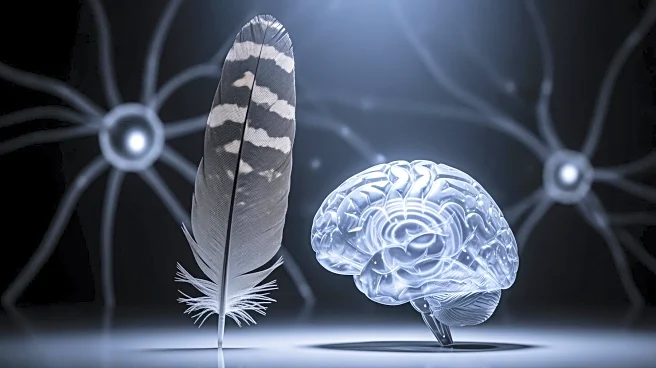What's Happening?
Researchers at Ruhr University Bochum have published findings on the evolutionary development of consciousness, focusing on why some species, like humans, developed consciousness while others did not. The study, featured in the Philosophical Transactions
of the Royal Society B, examines the functional roles of consciousness, categorizing it into three types: basic arousal, general alertness, and reflexive consciousness. The research highlights that consciousness evolved as a survival mechanism, with basic arousal serving to alert organisms to life-threatening situations. General alertness allows for focused attention, while reflexive consciousness enables self-reflection and societal integration. The study also explores consciousness in birds, noting that despite different brain structures, birds exhibit sensory consciousness and self-perception similar to mammals.
Why It's Important?
Understanding the evolution of consciousness is crucial for comprehending human cognitive development and the functional roles of consciousness in survival and societal integration. The research suggests that consciousness is a more widespread evolutionary phenomenon than previously thought, with implications for how different species process information and interact with their environment. This knowledge could influence fields such as neuroscience, psychology, and evolutionary biology, offering insights into the cognitive abilities of various species and the potential for consciousness in non-human animals. The findings may also impact ethical considerations regarding animal welfare and the treatment of species with demonstrated conscious experiences.
What's Next?
Future research may focus on further exploring the neurobiological foundations of consciousness in birds and other non-mammalian species, potentially leading to a broader understanding of consciousness across different evolutionary paths. Studies could investigate the practical applications of these findings in enhancing human cognitive abilities or developing artificial intelligence systems that mimic conscious processing. Additionally, ethical discussions may arise regarding the treatment of animals with demonstrated consciousness, influencing policies on animal rights and conservation efforts.
Beyond the Headlines
The study raises questions about the ethical implications of consciousness in animals, potentially affecting how society views and treats species with conscious experiences. It challenges traditional views on consciousness being exclusive to humans and certain mammals, suggesting a need for reevaluating animal welfare standards. The research also highlights the adaptability of evolutionary processes, showing that different brain structures can achieve similar functional solutions, which may inspire innovations in artificial intelligence and robotics.















